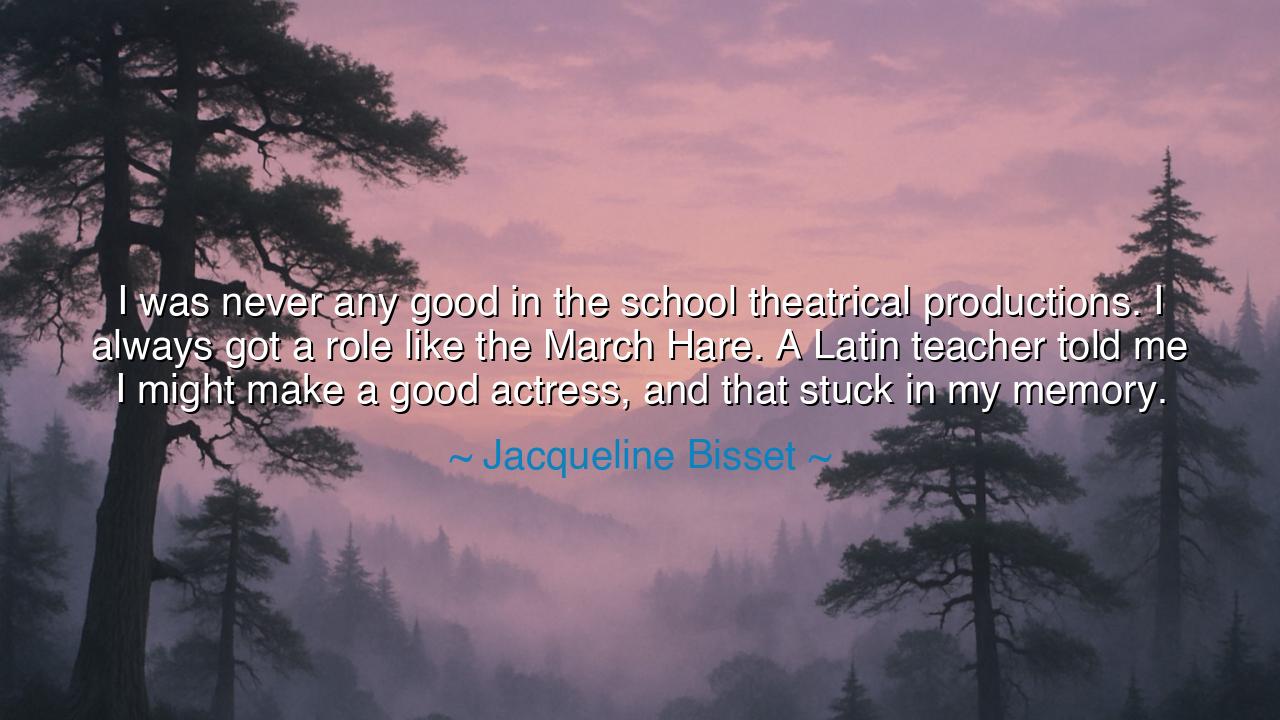
I was never any good in the school theatrical productions. I
I was never any good in the school theatrical productions. I always got a role like the March Hare. A Latin teacher told me I might make a good actress, and that stuck in my memory.






In this reflection of Jacqueline Bisset, we hear the eternal theme of humble beginnings, the spark of encouragement, and the mysterious way that destiny often hides itself in unlikely places. She confesses that she was never any good in the school theatrical productions, assigned to small and comic parts like the March Hare. Yet it was a single word, spoken by a Latin teacher, that took root in her memory: that she might indeed become a good actress. From such a seed, planted in the soil of doubt, grew the career of one who would later grace the screen with elegance and power.
The origin of this truth lies in the strange alchemy between failure and encouragement. In youth, we are often blind to our own gifts. We stumble, we falter, we are cast in roles that feel unworthy of our secret longings. Yet all it takes is a voice of recognition—sometimes from a teacher, sometimes from a stranger—to awaken the spirit within us. Bisset’s journey shows that greatness is not always born of immediate triumph, but often from the persistence to keep walking after early disappointment, guided by a remembered word.
Consider the story of Albert Einstein, who as a boy was thought slow, even told he might never amount to much. His teachers saw struggle where others later saw genius. Yet one teacher’s belief, one mentor’s recognition of his curiosity, encouraged him to keep seeking answers. Like Bisset’s Latin teacher, that affirmation became a lantern in the dark. Thus, the voices of those who teach carry a weight heavier than gold, for they shape the destinies of generations.
The image of the March Hare itself is symbolic. It is not the role of the hero, not the shining lead, but a figure on the edges—eccentric, strange, perhaps overlooked. Yet even such roles have their value, for they teach humility and resilience. Those who play the March Hare learn to bring life to the forgotten corners of a story, and perhaps it is from such hidden places that true artistry begins. The ancients knew this well: the smallest stone can anchor a temple, and the least likely voice may one day echo across the world.
What Bisset reminds us is that memory of encouragement has the power to endure for decades. One phrase from her teacher stayed alive in her heart, surviving beyond the moment, nourishing her even when doubts arose. We, too, must remember the sacred responsibility of our words. A careless remark can wound for a lifetime, while a single note of faith can raise a soul to its destiny. The teachers of this world are not merely conveyors of knowledge—they are shapers of identity.
The lesson we draw is this: do not despise small beginnings, nor dismiss the value of small roles. Life’s stage often prepares us in humble corners before we are ready to walk into the light. And if you are a teacher, a mentor, or even a passing stranger—remember that your words can be seeds. Plant them wisely, plant them with hope, for you may be speaking to one who will one day move the hearts of many.
Practically, let us hold fast to the words of encouragement given to us, and let us be generous in offering them to others. When you see even a spark of talent or promise, speak it aloud, for your voice may be the very one that gives courage to continue. When you are given a role, no matter how small, perform it with honor, for the practice of giving your best will prepare you for greater stages.
Thus, in Bisset’s story we find both humility and triumph. From the March Hare to celebrated actress, her path was not straight, but it was lit by a single remembered blessing. Carry this teaching in your heart: that greatness often begins in obscurity, and that destiny may whisper to us not through grand victories, but through the quiet faith of those who see in us what we cannot yet see in ourselves.






AAdministratorAdministrator
Welcome, honored guests. Please leave a comment, we will respond soon